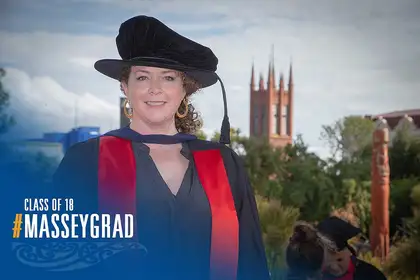
Dr Amy Granberg investigated the effectiveness of mindfulness-based phone apps for students for her PhD thesis.
Mindfulness-based therapies have shown promise in reducing stress and improving psychological wellbeing. Using a novel approach to mindfulness training, Doctor of Clinical Psychology graduate Dr Amy Granberg investigated the effectiveness of a mindfulness-based phone app for students.
“I was interested in the active components of mindfulness underlying clinical benefits observed in the literature. Most studies investigating mindfulness report outcome measures and not changes in mindfulness per se. Mindfulness is difficult to define given the many aspects it encompasses, making it challenging to measure. This research utilised both laboratory measures and self-report measures of mindfulness, in an attempt to capture information about mindfulness skills acquisition and processes,” Dr Granberg says.
A randomised controlled design was used to test the feasibility of a low intensity mindfulness app intervention to improve stress and enhance wellbeing in a student population. Fifty-four university students new to mindfulness participated in the study, which compared seven days of mindfulness practice using a mindfulness-based mobile app (MBMA), to an active control.
“It was hypothesised that mindfulness would reduce on measures of perceived stress, negative affect and emotion reactivity, and increase mindfulness and positive affect, compared to the control,” Dr Granberg says.
“There were no significant differences for perceived stress or wellbeing, and both groups demonstrated a significant decrease in negative affect. While the results of this study failed to provide support for the use of a mindfulness-based mobile app to reduce student stress, results indicate such an intervention for seven days may cultivate the ability to act with awareness and presents an original contribution to knowledge about the efficacy of mindfulness-based interventions.”
Dr Granberg says the brief seven-day intervention may not have allowed sufficient time for the effects to be captured. “It may be that self-directed mobile mindfulness apps require more time to generate beneficial effects.”
Dr Granberg lives in Grey Lynn with her husband Michael and nine-year-old daughter Beata. She holds a Master of Health Sciences, a Bachelor of Science and a Bachelor of Arts from the University of Auckland. She works as a clinical psychologist at Comprehensive Care in Albany, and is working to set up her own private practice in Grey Lynn.
She says her PhD studies wouldn’t have been possible without the support of School of Psychology staff and her family.
“I wish to express my gratitude for the support and assistance given to me by my primary supervisor Dr Heather Kempton for all her support through the years, imparting her knowledge and giving such prompt feedback. I gratefully acknowledge Dr Peter Cannon’s many hours spent training us in the lab and facilitating data processing, and Ella Kroch for her contribution to study recruitment and laboratory assessments as part of her honours project. I would also like to extend my sincere gratitude to all the students who participated in my study, taking time out of their busy schedules.
“Lastly, on a personal note, I am so grateful for the love and support from my family and friends, without whom this aspiration would not have been realised. To Michael, thank you for encouraging me to live my dream, for your unwavering support through the years and for all you do for us. To my lovely Beata, thank you for being a bright light in my life and for being so patient and encouraging when your mama had to work. To my parents and my grandparents, thank you for all you have taught me and for all the years of love, encouragement and inspiration. I dedicate this work to my grandmother Fay Foreman who led the way, and to my grandfather Jon Foreman, who ignited the flame.